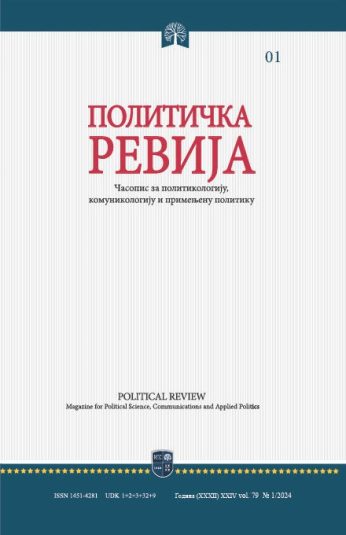Тема броја
КАПАЦИТЕТИ И СТАНДАРДИ ЕУ
ИНСТИТУЦИОНАЛНИ КАПАЦИТЕТИ ЕУ: ПИТАЊЕ ПАРЛАМЕНТАРНЕ КОНТРОЛЕ ЗАЈЕДНИЧКЕ БЕЗБЕДНОСНЕ И ОДБРАМБЕНЕ ПОЛИТИКЕ
Сажетак
Парламентарна контрола безбедносне политике ЕУ једно је од кључних питања институционалног система ЕУ. Како су национални парламенти држава чланица и Европски парламент укључени у процес развоја и спровођења безбедносне политике ЕУ? Аутор примећује да постоји «двоструки демократски дефицит» у инситуционалном систему ЕУ, како на нивоу националних парламената, тако и на нивоу Европског парламента. Јер, развој спољне и безбедносне политике ЕУ почива на међувладиној сарадњи, и улога Европског парламента је ограничена у тој области, али она није надомештена активним учешћем националних парламената у демократској контроли ове политике. Одредбе Лисабонског уговора доносе неке новине, које, међутим, суштински не мењају ствари. Чланак ће бити подељен у два дела. У првом делу, аутор ће анализирати улогу Европског парламента у процесу демократске контроле безбедносне политике ЕУ, док ће други део бити посвећен улози и ограничењима на ционалних парламената. Аутор закључује да постоји парадокс у институционалном систему ЕУ, јер спољна и безбедносна политика ЕУ има за циљ да промовише развој и јачање демократије и правне државе, док истовремено постоји двоструки демократски дефицит у процесу парламентарне контроле ове политике ЕУ.
Референце
- Agostini, Maria Valeria, “The Role of National Parliaments in the future EU”, International Spectator, XXXVI, n° 4, 2001.
- Auvret-Finck, Josiane, «Les moyens de la force armée», in Loïc Azoulai, Laurence Burgorgue-Larsen (dir.), L’autorité de l’Union européenne, Bruylant, Bruxelles, 2006.
- Berthu, Georges, Souchet, Dominique, Le traité d’Amsterdam, contre la démocratie. Texte intégral comparé et commenté, Paris, François-Xavier de Guibert, 1998.
- Bono, Giovanna, “The European Convention and Common Foreign and Security Policy: More Defence, Less Security”, Peace Studies Papers, Working Paper 7, 2004, http://www.brad.ac.uk/acad/pubs/pdf.
- Born, Hans, Dowling, Alex, Fuior, Teodora, Gavrilescu, Suzana, Parliamentary Oversight of Civilian and Military ESDP Missions: The European and National Levels, European Parliament, Brussels, 2007.
- Bosse-Platière, Isabelle, “Le Parlement européen et la PESC/PESD: les aspects juridiques”, Les Cahiers de l’IRSEM, n° 4, 2010.
- Brok, Elmar “Tackling the double democratic deficit of ESDP”, http://www.assembly-weu.org/en/presse/cp/2004/7.html.
- Comelli, Michele, “The Democratic Accountability of the CSDP and the Role of the European Parliament”, in Ettore Greco, Nicoleta Pirozzi, Stefano Silvestri (eds.), EU Crisis Management: Institutions and Capabilities in the Making, Instituto Affari Internazionali, 2010.
- Cutler, Robert, Von Lingen, Alexander, “The European Parliament and European Union Security and Defence Policy”, European Security, vol. 12, n° 2, 2003.
- Diedrichs, Udo, “The European Parliament in CFSP: More than a Marginal Player?”, International Spectator, 39, n° 2, 2004.
- Dumoulin, André, «Le Parlement européen et la PESD», Les Cahiers du RMES, vol. IV, n° 2, 2008.
- Fink-Hooijer, Florika, “The Common Foreign and Security Policy of the European Union”, European Journal of International Law, 5, n° 2, 1994.
- Gourlay, Catriona, Tappert, Malin, “Revising European’s Parliament Scrutiny of Foreign Affairs and Defence”, European Security Review, n° 21, 2004.
- Herranz-Surrallés, Anna, “The Contested ‘Parliamentarisation’ of EU Foreign and Security Policy”, PRIF-Report No. 104, 2011.
- Koenig-Archibugi, Mathias, “The Democratic Deficit of EU Foreign and Security Policy”, International Spectator, n° 4, 2002.
- Laschet, Armin, “Parliamentarisation of the European Security and Defence Policy”, Geneva Center for the Democratic Control of Armed Forces (DCAF), Working Paper n° 82, 2002.
- Матић Петар, “Политичке партије и европски избори”, Политичка ревија, вол. 18, бр. 4, 2008.
- Moravcsik, Andrew, “Why the European Union Strengthens the State: Domestic Politics and International Cooperation”, Center for European Studies, Working Paper n° 52, 1994.
- Peters, Dirk, Wagner, Wolfgang, Deitelhoff, Nicole, “Parliaments and European Security Policy. Mapping the parliamentary field”, in Dirk Peters, Wolfgang Wagner, Nicole Deitelhoff (eds.), The Parliamentary Control of European Security Policy, ARENA Report No 7/08,
- Стојадиновић, Миша, “Демократија између мита и стварности”, у Зоран Милошевић (ур.), Демократија и саборност, Институт за политичке студије, Београд, 2010.
- Стојановић, Ђорђе, “Утицај имплементационог процеса и политизације јавне управе на политички капацитет”, Национални интерес, вол. 7, бр. 2, 2011.
- Vukcevic, Dejana, L’émergence d’une Europe de la défense: difficultés et perspectives, Editions européennes universitaires, 2010.
- Зечевић, Слободан, “Еволуција надлежности Европског парламента”, Српска политичка мисао, вол. 34, бр. 4, 2011.
- Wagner, Wolfgang, “The Democratic Control of Military Power Europe”, Paper prepared for the presentation at the University of Oslo, 12 April 2005.
- Wagner, Wolfgang, “The Democratic Legitimacy of European Security and Defence Policy”, Papier occasionnel, n° 57, 2004.
- Wagner, Wolfgang, “The Evolution of CFSP Institutions: Where Does Democratic Accountability Stand?”, International Spectator, XXXIX, n° 2, 2004.
- Wessels, Wolfgang, “The Parliamentary Dimension of CFSP/ESDP Options for the European Convention”, Study submitted for the European Parliament, Bruxelles, TEPSA, 2002.
- Вукчевић, Дејана, “Безбедносна и одбрамбена политика ЕУ и постојећи институционални систем ЕУ”, Политичка ревија, вол. 18, бр. 4, 2008.
- Вукчевић, Дејана, “Финансирање безбедносне и одбрамбене политике ЕУ”, Српска политичка мисао, вол. 26, бр. 4, 2009.

